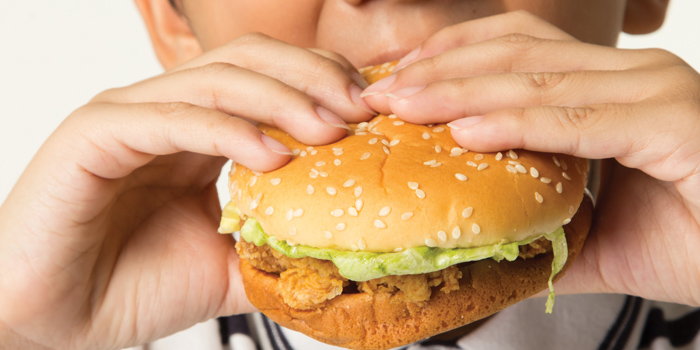
Muscat: Stop sending your children to school with junk food, parents in Oman have been told by head teachers involved in a government healthy eating scheme.
Some children sent to school with lunch boxes packed with junk food are turning up their noses at a new healthy option offered by the government.
School teachers and the government want parents to dump junk food so their children can eat healthier lunches, as part of a government campaign.
A healthy eating pilot scheme is being trialled in three government schools and, if successful, will then be rolled out across the country, but some children prefer to tuck in to the unhealthy option supplied by parents.
A principal at one of the schools involved said the programme aims to educate parents and children on the benefits of healthy eating and to stop parents sending their children to school with fried food lunch boxes.
“Children are used to coming to school with junk food in their lunch boxes or they buy their snacks from the school canteen and the healthy option received mixed reactions. The programme provides students with sandwiches made with brown bread, cake and juice,” Halima Al Nasri, Principal of Muttrah School for Basic Education, said.
She added: “The children need to adapt to the healthier option - not everyone likes brown bread. They are used to coming to school with packed lunch boxes with fried foods like nuggets and sausages.
“Parents are advised to educate and adapt their children to eating healthy food.”
Indian schools have also started a healthy tiffin (lunch) campaign and have formed healthy eating clubs in their schools, encouraging parents to opt for healthier lunchboxes.
Al Nasri’s school is one of three schools to undergo the Public Authority for Stores and Food Reserve’s “trial” programme to provide healthy meals daily to students until the end of the current curriculum, which is sponsored and delivered by Oman Flour Mills.
“Some parents buy sandwiches from vendors for their children’s lunch instead of making them at home. I advise parents to educate and adapt their children to eating healthy food,” she added. Students get chicken, egg and cheese sandwiches during lunch time along with a piece of cake and some juice.
“Some children like it, but others don’t. Some parents are on-board with healthy eating and provide their children with fresh fruit.
“This programme is equally important to parents as it is for the children and they have to instill a sense of healthier living in their children,” she added.
Oman has a poor record globally for adult obesity.
According to the latest data from the Global Nutrition Report 2016, Oman has the lowest adult obesity rate in the GCC, but one of the highest globally, ranked 168 out of 190 countries.
Children from three schools have been selected to receive 1,200 healthy lunch packs every day at school, including fruit and brown bread sandwiches.
The children have been weighed, measured and government officials will keep tabs on their stats while also looking to establish if the healthy regimen leads to any change in grades.
Faiqa Al Habsi, Head of the Healthy School Department at the Ministry of Health, explained that the program is aimed at studying the children’s behaviour when eating healthily and after gathering the results, if positive, the scheme will be implemented in all government schools.
“We took down the students’ weights to compare before and after the healthy food programme. We also want to see if their behaviour has changed since eating healthy. Are they more productive? Are they happier? Are their grades better?” Al Habsi told Times of Oman.
“After we gather the results at the end of the curriculum, we will be able to determine whether to implement the programme on all government schools in the Sultanate,” she added.
According to Al Habsi, roughly 1,200 packages of snacks are sent daily to the three schools: Muttrah School for Basic Education and Bahjat Al Ilm School for Basic Education and Al Huda School for Basic Education in Barka, who are part of the pilot programme.
Indian schools in Oman have been regularly giving feedback to parents of students on what to give the children for lunch. (tiffin)
“We provide the parents, especially of primary children, with a tiffin chart. They can choose from two or three balanced, healthy and non-fried food items,” said a teacher of Indian School.
Besides developing healthy habits, a large number of Indian schools have taken preventive measures.
Speaking to Times of Oman, Wilson George, Chairman of Board of Directors, Indian schools in Sultanate of Oman, said, “Dependence on junk food is affecting children’s health. It leads to [obesity], which in turn puts children risk of high cholesterol, high blood pressure, hypertension and pre-diabetic conditions.
“So, in many of our schools, our teachers are encouraging children to carry healthy food for tiffin and we are promoting healthy food in our canteens too. We started forming Health, Safety and Environment Clubs in our schools and these clubs are also expected to promote healthy food habits,” he added.
While it may be easy for parents to stuff their kids’ lunch boxes with ready-made food, parents of Indian School admit the initiative to encourage healthy eating has benefited the students.
“My child’s school has asked us not to give spicy and junk food for lunch and we have been advised to give more fruits and juices,” said S Basu, whose two sons’ study in Indian School.